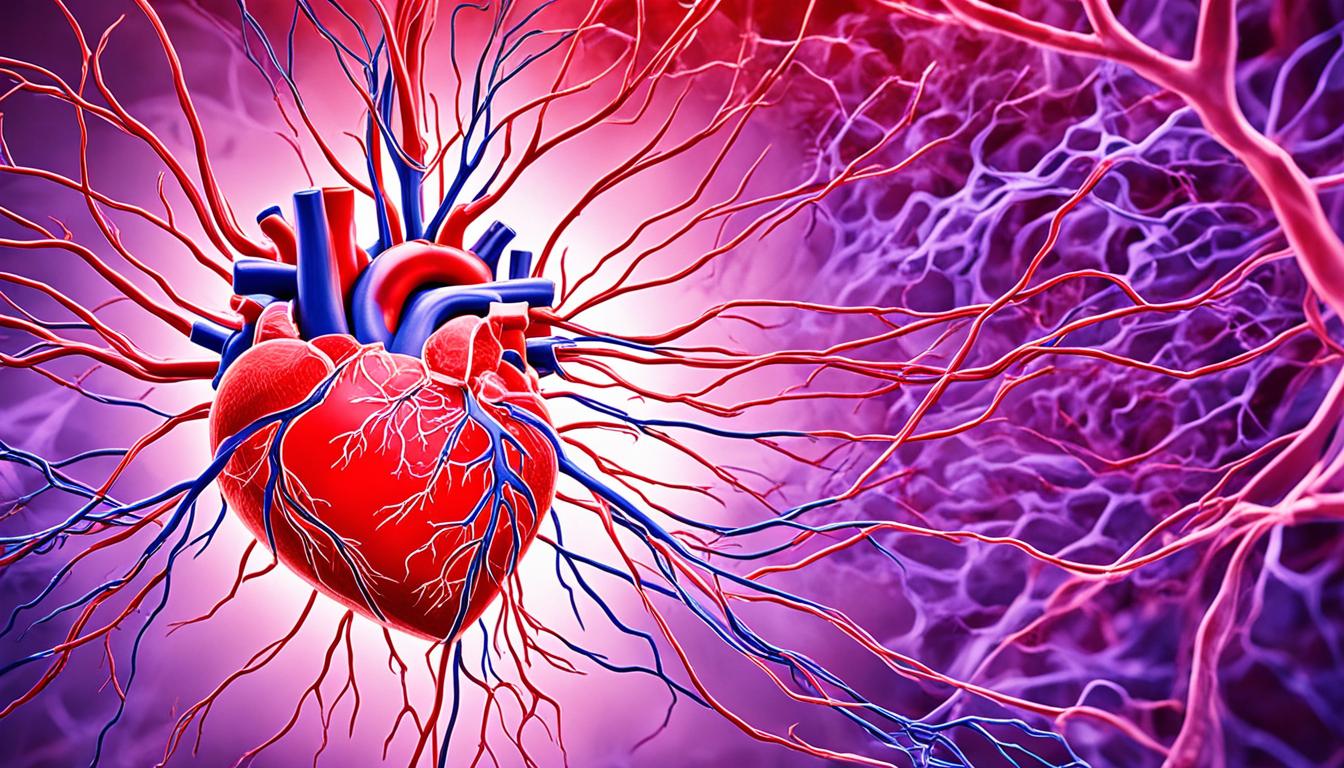Premature ventricular contractions (PVCs) are an irregular heartbeat type. They happen when ventricles start the heartbeat, not the sinoatrial (SA) node. This might lead to a skipped or extra heartbeat. It causes feelings like palpitations, dizziness, and lightheadedness.
PVCs can happen to anyone. Yet, they’re more common in older people and those with heart issues. Many things can lead to PVCs. These include low blood flow to the heart, heart attacks, cardiomyopathy, and more. Having high blood pressure or a heart disease increases the risk of PVCs.
Doctors diagnose PVCs with a checkup and tests like an electrocardiogram (ECG). Additional tests such as echocardiography might be needed. The treatment for PVCs varies. It depends on how often they happen and their impact on the person. Options include medicine, surgery to fix heart issues, or lifestyle changes. Also, doctors are looking into using stem cells for heart treatment.
Key Takeaways:
- PVCs are abnormal heartbeats from the ventricles, not the SA node.
- Common symptoms are heart palpitations, dizziness, and lightheadedness.
- Causes of PVCs are varied, including heart issues or imbalanced electrolytes.
- Risk factors comprise high blood pressure and conditions like heart disease.
- Diagnosis involves tests like physical exams and ECGs.
- Treatment can include drugs, surgery, or stem cell therapy.
PVCs and Heart Conditions
Premature ventricular contractions (PVCs) happen to some with heart issues. But, they can occur in anyone, even without these heart diseases. They are more likely in people with high blood pressure, coronary heart disease, and other heart conditions.
If someone with a heart condition gets PVCs, this might mean there’s a heart problem. They could also feel symptoms like shortness of breath, chest pain, or tiredness.
It’s key for people with PVCs and heart conditions to work closely with their doctor. They should look at ways to manage their heart condition and reduce PVCs. For each person, the treatment will be different based on their needs.
Common Heart Conditions Associated with PVCs
Here are the common heart conditions linked to PVCs:
- High blood pressure
- Coronary heart disease
- Dilated cardiomyopathy
- Hypertrophic cardiomyopathy
- Congenital heart disease
- Heart failure
PVCs as a Warning Sign
PVCs in people with heart issues can signal a serious heart problem. It’s very important not to ignore them. Seeking medical help and working with a doctor is vital for keeping these conditions in check.
For managing PVCs with heart conditions, treatment might include:
- Medicine for high blood pressure or controlling heart rate
- Antiarrhythmic drugs to stop abnormal heart rhythms
- Some might need catheter ablation to remove the faulty heart tissue
Addressing the heart condition and PVCs can greatly boost one’s heart health and quality of life.
Diagnosis and Treatment of PVCs
Diagnosing PVCs starts with a full review by a doctor. They look at your medical history and do a check-up. Then, they might use an ECG. This test tracks your heart’s electrical activity. Next, they could do an echocardiogram to see your heart’s shape and how it’s working. A stress test and blood tests can also help find the cause. These steps are key to spotting PVCs.
How doctors handle your PVCs depends on how much they bother you. For some, simple changes in what you do, along with medicines, might do the trick. Medicines like beta-blockers can help slow your heart. Others prevent strange heartbeats. If these don’t work, you might consider something called catheter ablation. It stops the areas in your heart causing the PVCs.
But, more than just medicines, changing your daily habits can also help. Things like not drinking alcohol or too much caffeine can make a difference. So can cutting out stress, staying at a good weight, and not smoking. These changes can lower how often you feel the PVCs. It’s really important to keep seeing your doctor to make sure your plan is working.

